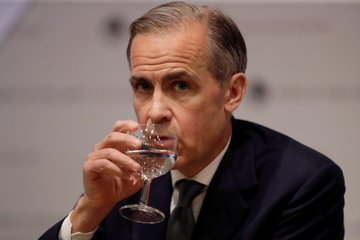The Bank of England shut down an audio feed of market-sensitive information after it was used to offer some traders a competitive time advantage.
The feed supplies investors and central-bank watchers with audio from the news conferences by Gov. Mark Carney in the minutes after interest-rate decisions are published. Small changes in language from bank officials on the future path of interest rates can often move the pound or U.K. government bonds.
The audio feed, meant to be a backup to the main audio and video feed provided by Bloomberg LP, has been “misused by a third-party supplier to the Bank since earlier this year to supply services to other external clients,” the central bank said in a statement, without identifying the supplier.
Traders have long sought to gain access to market-sensitive information as quickly as possible, and the rise of electronic and algorithmic trading has made such information even more valuable.
The bank, which also didn’t identify the clients who received the information from the backup-audio supplier, said it was in the dark about the alleged misuse. “This wholly unacceptable use of the audio feed was without the Bank’s knowledge or consent,” the central bank said.
Statisma News and Data Ltd., an audio-delivery technology company, says on its website that it has covered public events in the U.K. since 2010 including Bank of England news conferences. It said in a statement published on its website Thursday, “We DO NOT carry embargoed information and we DO NOT release information without it first being made available to the public.” A Statisma spokesman couldn’t be reached for further comment.
On April 29, a tweet from an account linked to Statisma’s website enticed customers to watch government news conferences through its feed. “Hear the news first…up to 10 seconds faster than watching them live on TV,” the tweet said. The tweet appears to have been taken down Thursday.
Another tweet, posted Nov. 7, the same day that Mr. Carney was set to speak, said, “Sign up for a free trial at statisma.com to hear him first.”
12.30 GMT. Mark Carney hosting Monetary Policy Report press conference, quarterly Inflation Report #BankofEngland #BoE #MarkCarney #InflationReport $GBP #interestrates #monetarypolicy #CentralBanks #economy
Sign up for a free trial at statisma.com to hear him first.
See Statisma News's other Tweets
A YouTube account that purported to be from Statisma News posted videos of Bank of England press conferences along with links to charts showing how the pound moved when Mr. Carney was speaking. This included a news conference on August 2, 2018, the day the bank raised interest rates for only the second time in a decade.
Statisma’s website said it is a unit of Encoded Media Ltd. Encoded Media describes itself as a media streaming company, founded in 2003, with the original aim of serving the finance industry. The companies share common directors according to U.K. corporate filings. Encoded executives couldn’t be reached for comment.
The Bank of England declined to comment on Statisma’s statement or on the social media posts from the @StatismaComms Twitter account. The monetary authority said Thursday it had referred the case to the Financial Conduct Authority, the U.K.’s market watchdog. Any misuse of the feed would likely fall foul of market abuse regulations, a person familiar with the FCA’s oversight role said.
The European Central Bank appears to have run into a similar issue. In September it started providing a low-latency or ultrafast audio feed of its press conferences, after the bank discovered that some companies were trying to sell access to a faster feed than the official video webcast, which has a delay of about 30 seconds. Audio-only feeds tend to be faster than video.
The new ECB audio feed has a delay of about three seconds, to help ensure a level playing field for listeners, an ECB spokesman said.
The Bank of England holds its news conferences at its fortresslike headquarters in the City of London. Reporters given access to rate decisions ahead of time are held in a “lock in” in the basement without internet access. After the decision is released, reporters move upstairs to an auditorium where the press conference takes place.
The press briefings often offer more detail and nuance than the official statements published on the central bank’s website. There are also question-and-answer sessions where the responses from policy makers at the BOE, including Mr. Carney, offer more spontaneous responses which have the potential to move markets.
“Having information a few seconds early—where fractions of a second make a difference—could be hugely advantageous,” said Ben Watford, partner and head of hedge funds at global law firm Eversheds Sutherland.
In 2017, the U.K. government restricted how it distributed economic data to markets after The Wall Street Journal documented how the information was leaking to traders before publication.
Central banks, including the U.S. Federal Reserve, have also come under criticism in recent years for giving preferential access to big investors, who can glean future policy decisions from the meetings.
The Fed said Thursday that it “aims to make its press conferences available as widely as possible by streaming them live directly to the public and through accredited news organizations,” according to a spokesman. “We only use systems that are open for broad distribution,” he said.
The Fed has a pool arrangement with three news organizations. One of them at a time is allowed to attend a press conference and broadcast live, sharing the footage with the others for distribution.
The Fed doesn’t have a separate audio-only feed.
Information leaks at central banks don’t occur often but are potentially consequential when they do.
Several years ago, the Federal Reserve mistakenly emailed market-sensitive minutes of a monetary-policy meeting to a group of people, including investors, a full day before the document was scheduled to be released to the public.
In 2017, Federal Reserve Bank of Richmond President Jeffrey Lacker resigned after revealing his involvement in a 2012 leak of confidential information about Fed policy deliberations.
The alleged breach comes at a sensitive time for the Bank of England. Mr. Carney is set to step down at the end of January after serving in the job since 2013. While generally respected for his handling of monetary policy, he has also drawn sharp criticism from investors and politicians for what some say have been overly pessimistic predictions about the effects of Brexit on the economy.
Boris Johnson’s incoming government, fresh off last week’s election victory, has yet to name a successor.
—Anna Hirtenstein, Caitlin Ostroff, Tom Fairless and Sarah Chaney contributed to this article.
Write to Anna Isaac at anna.isaac@wsj.com








